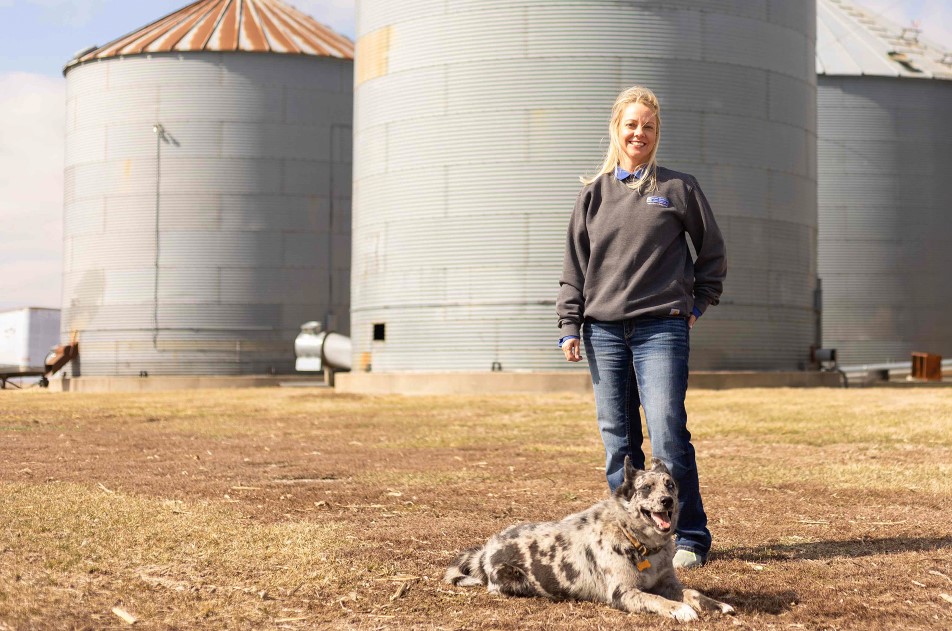
(Photo: Iowa Soybean Association / Joclyn Bushman)
The hopes and wishes for 2025
January 16, 2025
Increased trade, a new farm bill that works for farmers and just maybe, a growing season without major weather implications.
That’s the desire from three Iowa Soybean Association (ISA) board members who are hoping 2025 proves to be productive and profitable.
Focusing on the issues
ISA President Brent Swart says his wish list for 2025 can happen if everyone works together.
“I’d like to see a rally in commodity prices, thus resulting in more profitability for our Iowa farmers,” he says. “I’d like to see a farm bill passed, have better guidance concerning the biofuels industry and domestic feedstocks, and see some corrections to the indirect land use change for soybeans.”
For that to happen, work needs to be done in Washington, D.C.
“We need better direction and policies at the federal level,” Swart says. “We need to grow domestic usage and find new and diverse trade partners internationally. It’s critical and it is objective No. 1.”
He says, like many producers, the lack of anything happening in Congress has been frustrating.
“At the end of the day, it seems we can’t get anything done,” Swart says. “The political divides are pretty deep and just cannot come to any agreement.”
In Des Moines, Swart says he hopes state legislators can craft and pass a bill that improves and modernizes Iowa’s grain indemnity fund; as well as seeing policy that positively impacts the state’s property taxes.
But overall, Swart hopes legislators in Des Moines and D.C., focus on issues important to soybean producers.
“We just want to make sure Iowa farmers are best represented by their legislators,” he says.
Weather woes and staying flexible
ISA At-Large Director Aimee Bissell says she hopes 2025 provides reasonable and “normal” weather conditions in southwest Iowa where she resides.
“It would be nice to not to have another drought this year,” she says. “Maybe let’s say I would like something pleasant from Mother Nature – no droughts, derechos, nothing catastrophic.”
Bissell says she’s hoping positive action that boosts the biofuels industry would be part of any legislation at either the statehouse or in Washington.
“We rely heavily on what happens in D.C. and Des Moines,” she says. “And it’s not just about farmers, but rural communities overall.”
Bissell agrees with Swart about the importance of finding new markets, both domestically and overseas.
“That’s why I think ISA is terribly important,” she says, adding the organization helps legislators and others stay focused on policies including trade which can benefit soybean producers.
Bissell acknowledges 2025 could still prove difficult, considering the past couple of years of tight margins and lower prices.
“I do see a challenging year ahead, but you have to focus on what you can do now and what you can control,” she says. “We have to remain flexible.”
Educating politicians and the public
ISA District 4 Director Marty Danzer says he’s “sitting tight” and hoping grain prices will bounce back in 2025.
But he admits he’s anxious about this year, especially with talk surrounding the possibility of increased tariffs.
“That scares me the most,” Danzer says. “If the tariffs go into place, we’re going to be in trouble. The global market is a big part of what we do and we just can’t depend on domestic markets.”
Tariffs and the overall unpredictability of what will happen in 2025, however, is just part of being a farmer.
“We always have to make adjustments,” Danzer says. “We will need to pull in the reins a bit. We just can’t go out and buy a lot of new machinery or land right now.”
This year, he adds, may just be the beginning of some difficult times ahead. But Danzer believes educating legislators and the public is key to emerging out of these challenges that lie ahead.
“Politically, we need to keep in touch with our legislators at both the state and federal level and let them know we are concerned,” he says.
He says farmers are often an easy target for politicians because they only account for 1-2% of the overall population.
But the issues affecting farmers impact everyone, Danzer cautions.
“Whether they realize it or not, what happens on the farm impacts urban areas too,” he says. “If we have these tariffs, everyone will see higher prices, not just farmers.”
Like his colleagues, Danzer hopes a farm bill is passed, but says he does not believe it will happen anytime soon – perhaps later this year.
“Time will tell, because everybody still has to eat,” he says. “Everybody needs farmers, and we need to get that message across.”
ISA perspective
Matt Herman, chief officer for demand and advocacy, says ISA remains vigilant in working with legislators in 2025 to get things done that help soybean farmers.
At the state level, he says property taxes, updates to the state’s grain indemnity fund, the establishment of a glyphosate bill and improvements to Iowa’s forest reserve program, remain at the top of the list.
“Regarding the federal outlook, I think the main thing is we are looking forward to working with the new administration to get trade back on track,” Herman says. “We believe there remains a significant opportunity to do bilateral deals on agriculture. Farmers need new markets, and we need to diversify away from China - I think everyone agrees with that. Generally, we need to help them realize something is better than nothing and we can't let perfect be the enemy of good.”
Herman says there are concerns the United States will engage in a trade war, in combination of inaction on opening any new markets.
“That could create a very challenging situation for soybean farmers,” he says.
Back